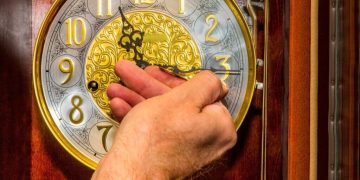Grandfather clocks are timeless pieces of craftsmanship, offering a blend of artistry, history, and functionality. Whether inherited, purchased, or discovered at an auction, determining the value of an antique grandfather clock can seem daunting. This guide will walk you through key factors to consider when assessing these majestic timepieces, providing clarity and expert insights along the way.
Look for a Maker’s Mark or Label
The first step in assessing your grandfather clock’s value is identifying its maker. Most antique clocks will have a maker’s mark, label, or engraving. These identifying features often appear on the dial, movement, or inside the case. Renowned clockmakers, such as Eli Terry, Seth Thomas, and Gustav Becker, carry significant value, as their works are sought after by collectors and enthusiasts. Authenticating these markings makes sure the clock isn’t a modern reproduction, which would hold considerably less value.
Examine the Clock’s Condition and Functionality
The condition of your clock plays an important role in determining its worth. Examine the case, movement, dial, and pendulum for signs of wear or damage. Original components generally lead to a higher valuation, though minor repairs using era-appropriate materials may not significantly affect the price. A fully functioning clock with accurate timekeeping will generally command a higher value than one requiring extensive repairs.
If the mechanics seem off, it’s worth consulting a professional clock repair specialist like The Clock Doctor to restore functionality, as this can boost the clock’s value while preserving its history. Avoid attempting DIY repairs—it could cause further damage and reduce its worth.
Assess the Material and Craftsmanship
The materials used in crafting the clock can provide valuable clues about its age and value. Look for solid woods like mahogany, oak, or walnut, which were commonly used in earlier time periods. High-quality joinery, intricate carvings, and inlay work often indicate expert craftsmanship and lend greater value to the piece. Additionally, clocks with embellishments such as brass fixtures, moon dials, or hand-painted features are a sought-after rarity.
Identify the Clock’s Age
Determining the clock’s production era is another important factor. Grandfather clocks made in the 18th and 19th centuries are highly desirable due to their historical significance. Research the style and design of the clock—such as the shape of the bonnet or detailing on the case—to identify its potential age and origin. You may find it helpful to compare it to known examples from specific periods or to consult historical records related to notable clockmakers.
Consult With Professional Appraisers
An appraisal from a qualified professional is invaluable for understanding the true worth of your grandfather clock. Clock specialists or certified appraisers are well-versed in assessing factors like maker provenance, market trends, and historical significance. They also offer expertise in distinguishing authentic antiques from fakes. Working with a professional guarantees accuracy, especially if you are considering selling your clock or adding it to an insurance policy.
Research Comparable Sales
Studying the market is important when assessing value. Researching sales of comparable antique grandfather clocks—either through online auction sites, antique stores, or appraisal databases—can give insights into current demand and pricing trends. Factors such as unique features, rarity, and condition will play into differences between prices, so identify those elements that set your clock apart.
Understand the Importance of Clock Repairs
Antique grandfather clocks often require ongoing care and maintenance to preserve their performance and appearance. Working with experienced repair professionals provides proper handling and repairs using period-accurate materials. Clocks that have been professionally restored often retain or increase their value compared to ones with poorly executed fixes. Maintaining service records can also contribute to the clock’s overall worth, as it reflects a commitment to preserving the timepiece’s history.
Look out for Historical Provenance
Grandfather clocks with a storied background or specific historical ties can carry added value. For example, a clock linked to a prominent family or historical era is likely to captivate collectors. Any documentation or certificates verifying the history of the piece can substantiate its provenance and boost its desirability in the market.
Embark on Your Valuation Journey
Assessing the value of an antique grandfather clock requires attention to detail, research, and professional guidance. With insights into its maker, materials, age, and condition, along with support from skilled appraisers and repair experts, you can unlock the story and true worth of your timepiece.


























